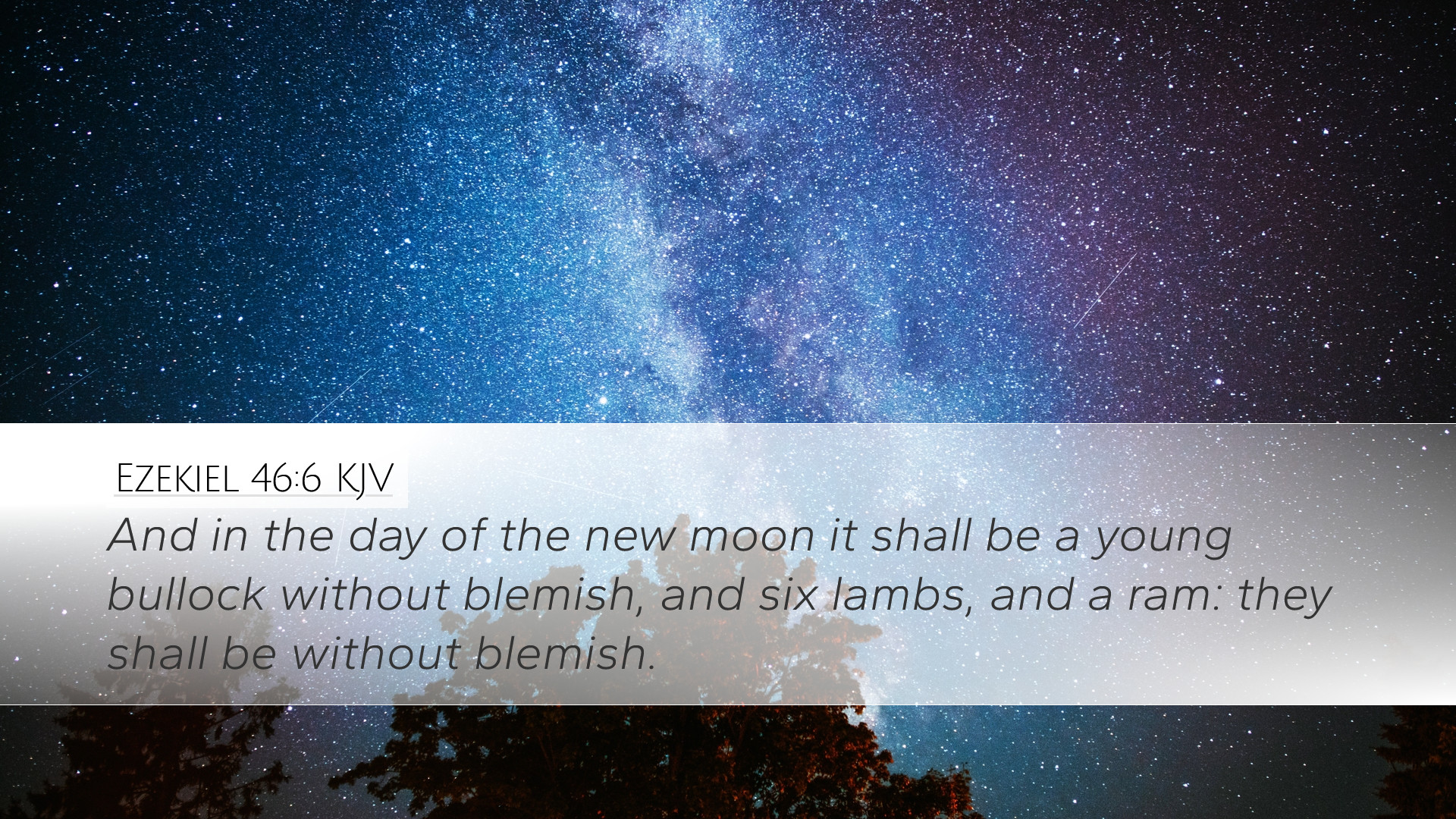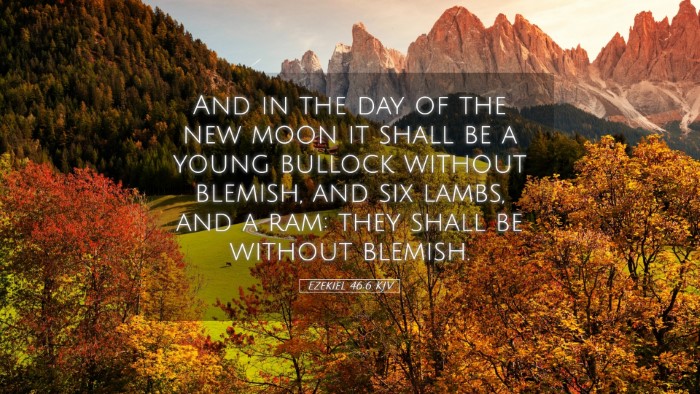Commentary on Ezekiel 46:6
Ezekiel 46:6: "And in the day of the new moon it shall be the Prince's part to offer burnt offerings unto the LORD, six lambs without blemish, and a ram without blemish." (KJV)
Introduction
This verse is a part of the prophetic vision given to Ezekiel concerning the future worship and organization of the temple system in Israel. It specifically addresses the ceremonial duties of the prince during the observance of the new moon, which holds significant theological and liturgical implications. Various public domain commentaries provide rich insights into this verse, examining its contextual meaning, symbolism, and relevance for modern practitioners of the faith.
Contextual Analysis
The context of Ezekiel’s prophecies is critical for understanding this verse. The book of Ezekiel is a mixture of judgment and hope, written during the Babylonian exile. Chapter 46 describes the regulations concerning temple worship in the eschatological period—pointing to future restoration both physically and spiritually.
Matthew Henry's Insights
Matthew Henry emphasizes that the new moon festivals were occasions for renewed dedication to God and that the offering specified in Ezekiel 46:6 reflects the spiritual significance of such festivals. Henry notes how the number and kind of offerings symbolize perfection and are indicative of a comprehensive commitment to worship. The lambs "without blemish" denote the necessity of purity and perfection in sacrificial offerings to God, underscoring God's demand for holiness.
Albert Barnes' Commentary
Albert Barnes elaborates on the applications of the new moon offerings, linking them to the idea of renewal. He states that the beginning of a new month—with its associated offerings—is indicative of spiritual beginnings and fresh starts in the believer's journey of faith. Barnes also emphasizes that the prince, likely representing Christ in his mediatorial role, leads in these offerings, symbolizing the intercessory nature of Christ as our High Priest. Thus, the rite signifies not merely remembrance, but active participation in the community's relationship with God.
Adam Clarke's Perspective
Adam Clarke takes a detailed look at the specifications of the sacrifices mentioned in this verse. He notes that "six lambs without blemish, and a ram without blemish" reflect a liturgical order that promotes consistency and reverence. Clarke links this to the concept of the Numerology of six as representing human labor and incompleteness, which contrasts with the holy perfection of God's commands. The ram signifies strength and leadership, reminding the people of God's providence and protection.
Theological Implications
From a theological viewpoint, Ezekiel 46:6 not only outlines ritual observance but also prefigures the eternal worship that believers will offer to God. The significance of the prince’s offerings during the new moon aligns with themes of renewal and restoration that permeate the entire book of Ezekiel.
- Reflection of God's Holiness: The offerings highlight God’s standard—perfection and purity are prerequisites for communion with the holy. This principle is echoed throughout Scripture and remains critical for contemporary worship practices.
- Christ-centered Fulfillment: The role of the prince is often interpreted as a typology of Christ, the true Prince, who offers himself as the perfect sacrifice. The fulfillment of these offerings in Christ demonstrates the continuity in God's redemptive plan.
- Symbol of New Beginnings: The reference to the new moon signifies new beginnings, a theme echoed in the lives of believers who are called to live in the light of God’s mercies, which are new every morning (Lamentations 3:22-23).
Practical Applications
For pastors, students, and theologians, the study of Ezekiel 46:6 offers several practical applications:
- Encouragement for Worship: Like the offerings during the new moon, Christians are encouraged to partake in regular, intentional worship, recognizing that each day is a new opportunity to glorify God.
- Call to Holiness: The need for ritual purity holds relevance today. It exhorts believers to pursue holiness in their lives, reflecting God’s character in daily living.
- Understanding Christ’s Role: A deeper understanding of Christ’s intercessory role can transform one’s prayer life, fostering a deeper sense of reliance on His righteousness.
Conclusion
Ezekiel 46:6 encapsulates critical elements of worship that transcend time and culture. The joining of ritual, sacrifice, and the role of the prince in this verse provide a deep foundation for understanding both the historical context and future applications of worship in the life of believers. As such, this verse invites reflection on God’s holiness, the significance of renewed worship, and the quintessential role of Christ in mediating our relationship with God.


